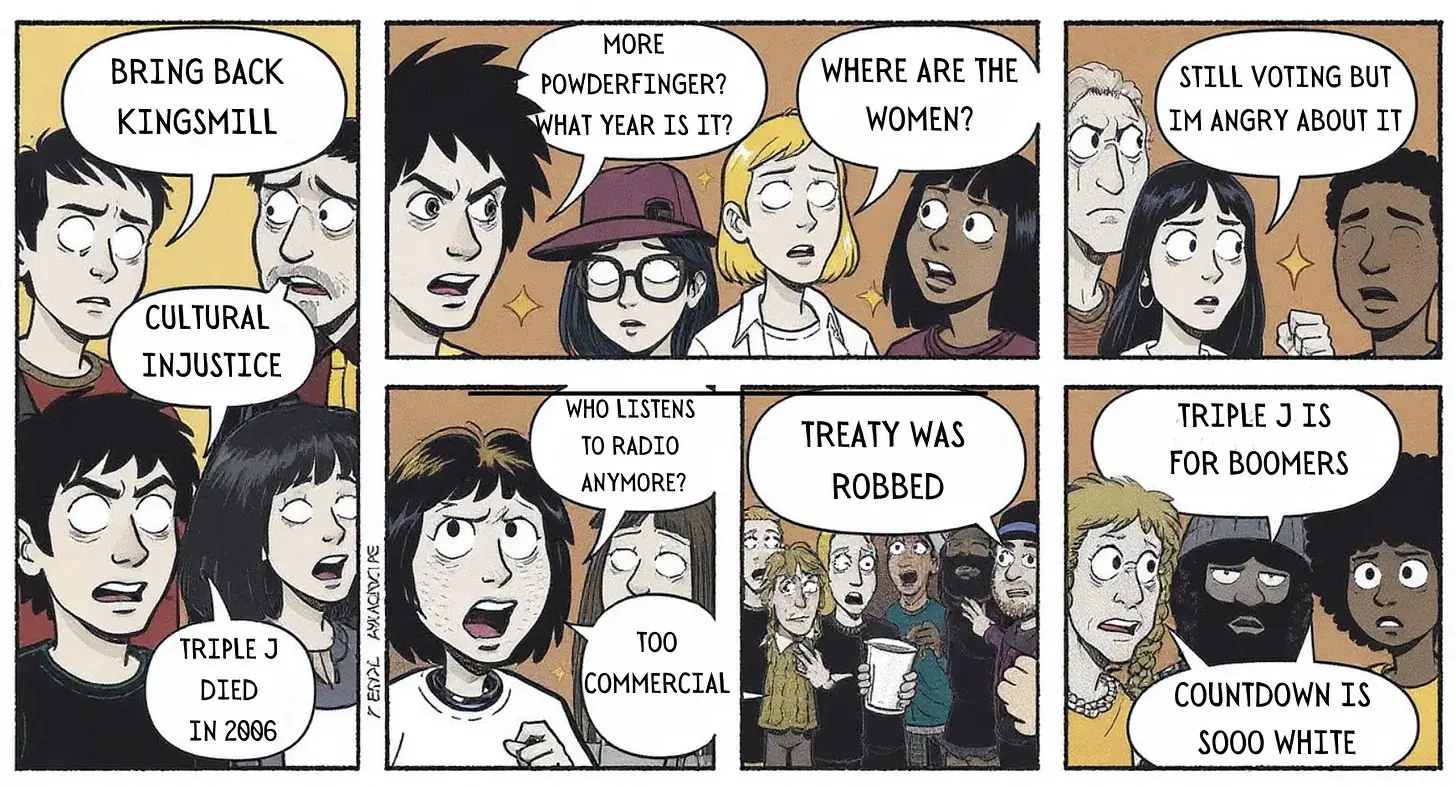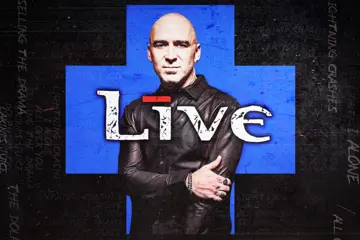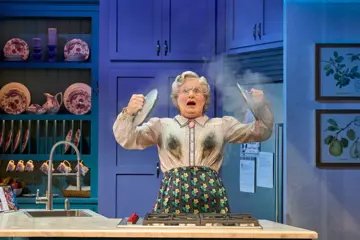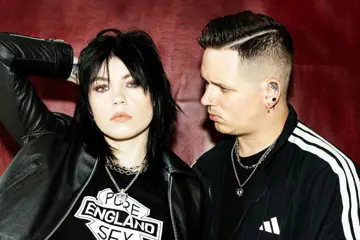“How deeply, deeply fucking lucky we are in this country to have a RADIO station that galvanises people like triple j does…”
@nickelly.mp3 (via Lachie Pring)
Triple J is having what you might call a moment - and by “moment,” I mean the recent Hottest 100 of Australian Songs, which as you would know, had everyone listening, talking, and getting weirdly emotional. Somehow it got 2.6 million people invested in a radio countdown … while managing to disappoint half of them.
The Hottest 100 has become Australia's most successful form of cultural self-harm. We voluntarily subject ourselves to hours of countdown anticipation, only to spend the next week arguing about why our taste is better than everyone else's.
And we LOVE it.

Counting down the top homegrown songs isn’t some revolutionary idea, commercial radio networks have been doing it for years. Triple M’s "Ozzest 100”, one example, same concept, similar songs, but did you vote? Did your local pub stream it? Did it crash Spotify? Did it generate a single passionate argument about Australian cultural identity?
“Nope.”
Exactly.
When Triple J do it - it’s different. The Hottest 100 isn’t just a countdown, it’s a national sport. Albo’s posting his picks. Pubs stream it. Share houses throw backyard parties. Someone always makes a spreadsheet. Everyone's backyard speakers get a workout, and your dad’s in the corner yelling, “Barnesy was robbed!”
Don't miss a beat with our FREE daily newsletter
For one day, everyone’s tuned in, arguing about bangers like it’s a team sport - and somehow, it brings us all together. Meanwhile, in radio land, Triple J should be dead, buried, and replaced by a true crime podcast.
As revealed on Mumbrellacast by Tim Burrowes, the average number of 18-24s listening to Triple J, across the 5 capital cities, at any given time is 8000.
That ain’t a typo.
So what is it about Triple J that makes people care this much - even when they’re tuning out?
There’s A Bit Of The Js In All Of Us
Let’s break it down.
There are the Lifers - still voting every year, still convinced 2006 was peak Triple J, still holding a candle for Richard Kingsmill.
The Unearthed Believers - Artists who got their start on the platform and treat Triple J like it personally saved their career from bedroom obscurity.
The Critics-Who-Care - Ex-listeners who “aged out” to Double J but still binge every Like A Version like their life depended on it.
The Nostalgics - Who tune in once a year to feel something, then spend the rest of their time listening to Spotify's "This Is: 2000s Alternative."
The TikTok Discoverers - Gen Z fans who found Triple J on social media, think the hosts are hilarious, and want weirder music (which is both refreshing and slightly alarming).
The Ride-or-Dies – Current listeners who genuinely love what Triple J is doing now and forever and don't understand what everyone's complaining about.
And the Skeptics - The "Who even listens to radio anymore?" crowd who somehow always know exactly what Triple J played yesterday.
Seven tribes united by one thing: an unhealthy emotional attachment to a radio station's playlist decisions.
The Impossible Standards Problem
Triple J has achieved something remarkable: they've convinced Australia that a youth radio station should solve cultural representation, preserve musical integrity, discover new talent, maintain nostalgic relevance, AND somehow represent everyone's personal taste simultaneously.
No pressure - just half the country emotionally over-invested.
Every song choice risks triggering a pile-on.
Too much pop? “It’s gone commercial.”
Too much Oz rock? “It’s stuck in the past.”
An American artist wins the Hottest 100? “It’s not even ours anymore.”
The Wiggles take #1 as a meme while an Indigenous artist misses the top spot? “Cultural injustice.”
The latest Hottest 100 was peak chaos: 2.6 million votes, massive engagement, and endless debates. Some called it a “glorious love letter” to Australian music. Others? “It’s giving Dad FM vibes”.
It's like being asked to DJ everyone's wedding simultaneously while also being held responsible for the state of Australian music culture.
Good luck with that.
Which brings us to the question that’s haunted programmers ever since time spent listening started to dwindle …
Ratings Or Relevance?
Commercial radio has the ratings, Triple J has the cultural pulse. One tracks who’s listening, the other sparks full-blown group chat wars over #47. But the real power move, is what appears to be the unattainable trifecta;
Scale. Emotion. And a good old-fashioned cultural pile-on.
Because it’s not just about who’s tuning in - it’s about giving a shit.
And in 2025, Triple J still makes people care, even the ones who swear they’ve stopped listening.
Irene Hulme is one of Australia’s leading radio strategists. With a history as music and content director at some of Australia’s biggest radio brands including Triple M, Hit and Nova, she now runs the Content This substack and can be heard weekly on the Game Changers Radio podcast.
















